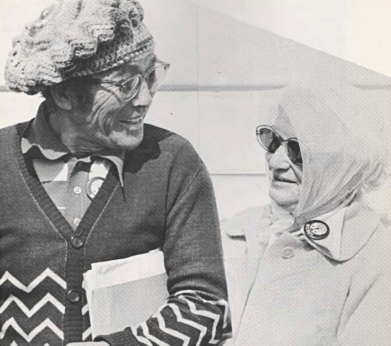Mosaic - Karl Yoneda
1906-1999 | Born in Glendale, California | Arrived on Angel Island in 1926
Karl Yoneda was kibei, a Japanese American who was born in the US but educated in Japan. When he returned to the US as an adult, he was detained on Angel Island even though he was a US citizen. Karl was a lifelong activist and labor organizer.
He remained committed to his political beliefs despite suffering personal injustices. “If I learned any lesson from my two-month detention [on Angel Island], it was that I had to ganbaru and gaman, I had to keep at it and persevere.”
Karl in Hiroshima with the book Memoirs of a Revolutionary tucked beneath his arm, 1923. Source: Ganbatte: Sixty-Year Struggle of a Kibei Worker.
Karl, then known as Goso, returned to the US at age 20 after spending thirteen years in Hiroshima, Japan. He had become politically active in his teens, and he left Japan to avoid being drafted into the Imperial Japanese Army. Karl had his US birth certificate with him, but the cousin who was supposed meet him at the port to confirm his identity did not show up. Karl was sent to Angel Island, where he was detained for two months.
Interior of the detention barracks. Courtesy of California State Parks
Karl passed the time in the detention barracks by reading the Nichi Bei, a Japanese-American newspaper. He channeled his feelings of loneliness and despair into writing waka, thirty-one syllable traditional Japanese poems. Even after his cousin finally came to testify on his behalf, immigration officials remained suspicious. They eventually released him after investigating his sister in Los Angeles.
Karl and his wife Elaine Black in Los Angeles, 1933. Source: Ganbatte: Sixty-Year Struggle of a Kibei Worker.
Karl settled in Los Angeles, where he became active in local labor and longshoremen’s unions as well as the Communist Party. He even changed his name from Goso to Karl as a tribute to Karl Marx. He participated in many protests and strikes. At one protest he was beaten and arrested, and a labor organizer Elaine Black helped bail him out of jail. They fell in love, but had to travel to Seattle, Washington to marry due to laws against interracial marriage in California.
Karl, Elaine, and Tommy at the Manzanar concentration camp, 1942. As a white woman Elaine was not required to live at Manzanar. She went voluntarily, refusing to be separated from her husband and son. Courtesy of NPS Trading Cards.
Karl, Elaine, and their young son Tommy were imprisoned at the Manzanar concentration camp during World War II. Despite his unjust treatment by the US government, Karl’s fierce opposition to the Japanese imperial government drove him to volunteer for US Military Intelligence. He served with distinction in the China-Burma-India campaign.
Karl and Elaine at the 1972 Manzanar Pilgrimage. Courtesy of the Manzanar Committee.
After the war, Karl remained active in the anti-war, anti-imperialism, labor, and Asian American movements. He helped organize the first pilgrimages to Manzanar and joined efforts calling for reparations for Japanese Americans. Karl returned to Angel Island forty years after his detention as part of a group fighting to preserve the immigration station as a historic site.







